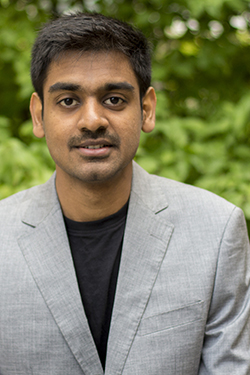"I'm a person who enjoys nature. Sweden, as a country, is filled with lots of greenery and beautiful lakes all around"
Cheerudeep comes from India and his home university is the SRM University in Chennai. He loves cycling, travelling and programming.

What made you choose KTH and Sweden for your studies?
In my bachelors, I was involved in robotics projects and after working for two years in a start-up in the field of developing control algorithms, I thought it would be best to strengthen my knowledge in this field and was searching for a master's programme.
When I had a look at the course curriculum of this programme, I found that it best suits my interests, and the possibilities to choose courses from other tracks seemed appealing. The high global ranking of KTH's Electrical Engineering school, the industrial collaborations and cutting-edge research further motivated me to choose KTH.
Learning about Sweden's work culture and the balance between personal and work life impressed me. People over here respect that one should have time for their personal life, which is necessary once you graduate and start working in the industry. I also experienced this when I did my summer job at Volvo cars in Gothenburg.
What do you like most about KTH?
At KTH I feel the world is around me, as students from across the globe come to KTH to pursue their education, creating a cultural diversity. One can get to learn about their cultures, their country and the most important thing is to experience a variety of food recipes :)
What's unique with your programme?
Systems, control and robotics is a broad field. We can choose between control theory, which is my favourite and also dive into machine learning and artificial intelligence, which are fascinating topics. We get to choose subjects combining both these fields, which is unique to this programme.
If we look at control of autonomous vehicles, we need background on control theory to develop algorithms. We also need surrounding information of the vehicles as an input for the control algorithms, which is the field of perception. Machine learning and AI plays an important role in handling this information, so having deep knowledge in both these fields will set you as a unique engineer.
Tell us more about your favourite course so far.
I would pick "Model Predictive Control" as one of my favourite subjects, even though it's a 1980's algorithm. Its usage in the industry has increased drastically, due to the increase in computation power the modern computers provide.
Also, a lot of research is being done to increase its usage to wider applications. It is impressive in the way it solves a challenging control problem - "Reference Tracking" - by taking into account how the system would react in the future and at the same time satisfying constraints applied on states and controls.
What are your impressions of Stockholm and Sweden?
I'm a person who enjoys nature. Sweden, as a country, is filled with lots of greenery and beautiful lakes all around. Coming from the Southern part of India, I had never experienced winter snow or seen the true beauty of autumn and spring, nor the frozen lakes.
I felt this is the best place to fall in love with nature and experience the true colours of it, along with the joy of waiting for the short summer to arrive.
What is your best memory so far from your time at KTH?
I got a chance to be part of Students' Nobel Night Cap (SNNC), which is created by students to celebrate the Nobel laureates after the Nobel Banquet. It is a wonderful chance to actually meet Nobel laureates!
What do you think the differences are between studying at KTH and your home university?
There are differences when comparing the education system at KTH to my home university. The way how each semester is broken down into two periods, each period being nearly two months is one thing. It feels very rapid and the good side of it is that you get to concentrate only on those specific subjects in that period and dive deep into them.
Almost all the courses in this program have an exam duration of 5 hours, which I felt would be exhausting. But when I wrote my first exam at KTH, I changed my opinion, because they test your ability to reason out and apply what you have learnt in the courses to new problems, which requires time and is fun - not exhausting at all.
If you don't perform well, you always get the chance to do it again and improve your grade.
What would you like to say to students thinking of choosing KTH for master's studies?
"Just Choose It". KTH provides various opportunities to students, other than the technical and practical exposure that one would expect in a typical master's programme.
There is KTH innovation - which may fund your ideas to turn them into a start-up, KTH Formula Student (student association) and many research projects on-going in collaboration with industry. KTH provides excellent opportunities to build a great career ahead, be it in academics or industry.

